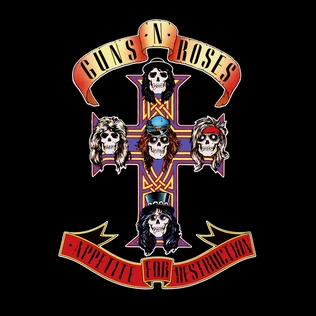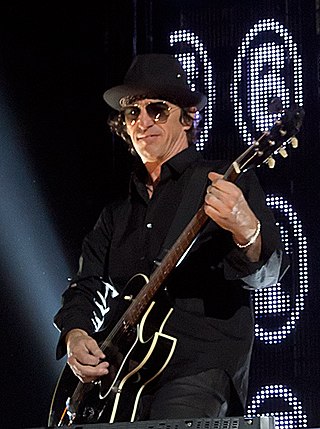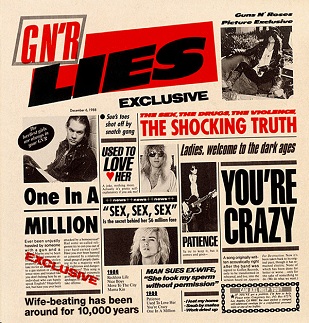Related Research Articles

Saul Hudson, known professionally as Slash, is a British-American musician who serves as the lead guitarist of the hard rock band Guns N' Roses, with whom he achieved worldwide success in the late 1980s and early 1990s. Slash has received critical acclaim and is considered one of the greatest guitarists of all time.

W. Axl Rose is an American singer and songwriter. He is best known for being the lead vocalist and lyricist of the hard rock band Guns N' Roses, and has been the band's sole constant member since its inception in 1985. Possessing a distinctive and powerful wide-ranging voice, Rose has been named one of the greatest singers of all time by various media outlets, including Rolling Stone, NME and Billboard.

Appetite for Destruction is the debut studio album by American hard rock band Guns N' Roses, released by Geffen Records on July 21, 1987. It initially received little mainstream attention, and it was not until the following year that Appetite for Destruction became a commercial success, after the band had toured and received significant airplay with the singles "Welcome to the Jungle", "Paradise City", and "Sweet Child o' Mine". The album went on to peak at number one on the US Billboard 200, and it became the seventh best-selling album of all time in the United States, as well as the best-selling debut album. With over 30 million copies sold worldwide, it is also one of the best-selling albums globally.

Jeffrey Dean Isbell, best known as Izzy Stradlin, is an American guitarist, singer, and songwriter. He was a co-founder, rhythm guitarist, and backing vocalist of the hard rock and heavy metal band Guns N' Roses, which he left at the height of their fame in 1991, and with whom he recorded four studio albums.

Live ?!*@ Like a Suicide is an EP by American hard rock band Guns N' Roses, released on December 16, 1986, on the UZI Suicide record label. When referred to by band members, they have simply called the EP Live Like a Suicide. The record itself was reportedly limited to only 10,000 copies, released only in vinyl and cassette formats.

G N' R Lies is the second studio album by American hard rock band Guns N' Roses, released by Geffen Records on November 29, 1988. It is the band's shortest studio album, running at 33 and a half minutes. The album reached number two on the US Billboard 200, and according to the RIAA, has shipped over five million copies in the United States.

Velvet Revolver was an American hard rock supergroup consisting of Guns N' Roses members Slash, Duff McKagan and Matt Sorum, alongside Dave Kushner formerly of punk band Wasted Youth, and Scott Weiland formerly of Stone Temple Pilots. The band formed in 2002 and was active until 2008, when Weiland left the band abruptly to rejoin Stone Temple Pilots.

"Sweet Child o' Mine" is a song by American rock band Guns N' Roses. It appears on their debut studio album, Appetite for Destruction (1987). In the United States, the song was released in June 1988 as the album's third single, topping the Billboard Hot 100 chart and becoming the band's only US number-one single. In the United Kingdom, the song was released in August 1988, reaching number 24 on the UK Singles Chart the same month. Re-released there in May 1989, it peaked at number six.

Michael Andrew "Duff" McKagan, is an American musician. He played bass for twelve years in the hard rock band Guns N' Roses, with whom he achieved worldwide success in the late 1980s and early 1990s. McKagan rejoined the band in 2016, following their induction into the Rock and Roll Hall of Fame.

The Use Your Illusion Tour was a concert tour by American rock band Guns N' Roses which ran from January 20, 1991, to July 17, 1993. It was not only the band's longest tour, but one of the longest concert tours in rock history, consisting of 194 shows in 27 countries. It was also a source of much infamy for the band, due to riots, late starts, cancellations and outspoken rantings by Axl Rose.

"Sympathy for the Devil" is a song by English rock band the Rolling Stones. Written by the songwriting partnership of Mick Jagger and Keith Richards, it is the opening track on the band's 1968 album Beggars Banquet. The song has received critical acclaim and features on Rolling Stone's 500 Greatest Songs of All Time list. It is the 22nd best ranked song on critics' all-time lists according to Acclaimed Music.

Chinese Democracy is the sixth studio album by the American hard rock band Guns N' Roses, released on November 23, 2008, by Black Frog and Geffen Records. It was the first Guns N' Roses studio album since the 1993 covers album "The Spaghetti Incident?", and their first album of original studio material since Use Your Illusion I and II (1991). It underwent a protracted recording process, delayed by personnel and legal problems, label interference, and vocalist/producer Axl Rose's perfectionism. It was the first Guns N' Roses album not featuring classic lineup members Izzy Stradlin, Slash, and Duff McKagan, as well as the first not produced by long-time producer Mike Clink; instead it was produced by Rose and Caram Costanzo.

"Welcome to the Jungle" is a song by American rock band Guns N' Roses, featured on their debut album, Appetite for Destruction (1987). It was released as the album's second single initially in the UK in September 1987 then again in October 1988 this time including the US, where it reached number seven on the Billboard Hot 100 and number 24 on the UK Singles Chart.

"Don't Cry" is a song by American hard rock band Guns N' Roses, two versions of which were released simultaneously on different albums. The version with the original lyrics is the fourth track on Use Your Illusion I, while the version with the alternate lyrics is the 13th track on Use Your Illusion II. Only the vocal tracks differ, and even then only in the verses; however, in those verses, not only are the words entirely different, but the meter and melody are also slightly different. There is also a third version, officially released only on the single for the song, which was recorded during Appetite for Destruction sessions in 1986.

Guns N' Roses is an American hard rock band from Los Angeles, California, formed in March 1985 when local bands Hollywood Rose and L.A. Guns merged. When they signed to Geffen Records in 1986, the band's "classic lineup" consisted of vocalist Axl Rose, lead guitarist Slash, rhythm guitarist Izzy Stradlin, bassist Duff McKagan, and drummer Steven Adler. The current lineup consists of Rose, Slash, McKagan, guitarist Richard Fortus, drummer Frank Ferrer and keyboardists Dizzy Reed and Melissa Reese.
"Rocket Queen" is a song by American rock band Guns N' Roses, featured on their debut studio album, Appetite for Destruction (1987). The song is notable for incorporating moans from a woman, Adriana Smith, who was recorded having sexual intercourse with the band's singer, Axl Rose.
"Coma" is a song by the hard rock band Guns N' Roses. It is the final song on their album Use Your Illusion I. At 10 minutes and 14 seconds, it is the longest track released by the band, and has no choruses.

"Civil War" is a song by American rock band Guns N' Roses that originally appeared on the 1990 compilation Nobody's Child: Romanian Angel Appeal and later on the band's 1991 album, Use Your Illusion II. It is a protest song on war, referring to all war as "civil war" and stating that war only "feeds the rich while it buries the poor". In the song, lead singer Axl Rose asks, "What's so civil about war, anyway?"

The Not in This Lifetime... Tour was a concert tour by hard rock band Guns N' Roses, spanning from April 1, 2016, to November 2, 2019. It featured classic lineup members Axl Rose, Slash and Duff McKagan, marking the first time since the Use Your Illusion Tour in 1993 that the three performed together. After the previous tour in 2014, guitarists DJ Ashba & Ron "Bumblefoot" Thal, bassist Tommy Stinson and keyboardist Chris Pitman left Guns N' Roses, leaving the band with several open spots. Former members Slash and McKagan rejoined the band and Melissa Reese joined as keyboardist. The group embarked on a world tour that spanned all continents except Antarctica. They performed 175 shows making it their third longest tour ever, just behind the Use Your Illusion Tour and the Chinese Democracy Tour. The group welcomed former drummer Steven Adler to the stage for several shows as a guest spot, the first time he had played with the group since 1990. The tour has been a financial success, grossing over $584.2 million, making it the fourth-highest-grossing concert tour of all time. The tour was 2016's highest-earning per-city global concert tour as well as the fourth-highest-grossing overall that year. In 2017, the tour ranked as the second highest grossing worldwide tour. The tour was honored at the Billboard Live Music Awards in November 2017, winning Top Tour/Top Draw and being nominated for Top Boxscore.
References
- ↑ Feeney, Joe (September 30, 2014). "Jungle: The Axl Rose Story (part two)". B-Sides TV. Archived from the original on July 30, 2020. Retrieved July 30, 2020.
- ↑ Wall, Mick (January 2002). Classic Rock . p. 93.
{{cite magazine}}: Missing or empty|title=(help) - ↑ Pareles, Jon (September 15, 1991). "Guns 'n' Roses Against the (Expletive) World". New York Times . Retrieved June 20, 2011.
- 1 2 James, Del (August 10, 1989). "Axl Rose: The Rolling Stone Interview". Rolling Stone . No. 558. Retrieved July 30, 2020.
- ↑ G N' R Lies (Cover art). Guns N' Roses. Geffen. 1988.
{{cite AV media notes}}: CS1 maint: others in cite AV media (notes) (link) - 1 2 James, Del (1992). "I, Axl". RIP. Archived from the original on July 19, 2002. Retrieved July 30, 2020.
- ↑ Cave, Damien (October 11, 2007). "Axl Rose: American hellhound". salon.com. Archived from the original on October 11, 2007. Retrieved July 30, 2020.
- ↑ Lifton, Dave (May 5, 2018). "Guns N' Roses Omits 'One in a Million' From Box Set". Ultimate Classic Rock. Retrieved July 30, 2020.
- ↑ Parker, Lyndsey (August 28, 2020). "Nirvana manager recalls Kurt Cobain/Axl Rose VMAs feud: 'They would be friends if Kurt were alive today'". Yahoo! Entertainment . Retrieved September 16, 2020.
- ↑ Neely, Kim (April 2, 1992). "Axl Rose: The RS Interview". Rolling Stone. No. 627. Archived from the original on March 21, 2009. Retrieved July 30, 2020.
- ↑ Banas, Erica (July 8, 2020). "Guns N' Roses: All 87 Songs Ranked". 93.3 WMMR. Retrieved July 30, 2020.
- ↑ "Every Guns N' Roses Song Ranked, Worst to Best". Loudwire. June 27, 2018. Retrieved July 30, 2020.
- ↑ Busbee, Jay (August 11, 2016). "All 80 Guns N' Roses Songs, Ranked". Medium. Retrieved July 30, 2020.
- ↑ Helman, Peter (May 4, 2018). "Guns N' Roses' Massive New Box Set Omits "One In A Million"". Stereogum . Retrieved May 8, 2018.
- ↑ Hiatt, Brian (August 14, 2018). "Slash Speaks! Inside the Guns N' Roses Reunion and His New Album". Rolling Stone. Retrieved September 16, 2020.
- 1 2 "Just a Little Patience". SPIN Magazine . July 1999.
- ↑ Ressner, Jeffrey; Christensen, Mark (January 24, 1991). "Slash: The Rolling Stone Interview". Rolling Stone. Retrieved July 30, 2020.
- ↑ Kent, Nick. Pop, Iggy. The Dark Stuff: selected writings on rock music Page 232. Da Capo Press, 2002. ISBN 0-306-81182-0, ISBN 978-0-306-81182-1
- ↑ Grow, Kory (June 6, 2019). "How Duff McKagan Got Woke". Rolling Stone.